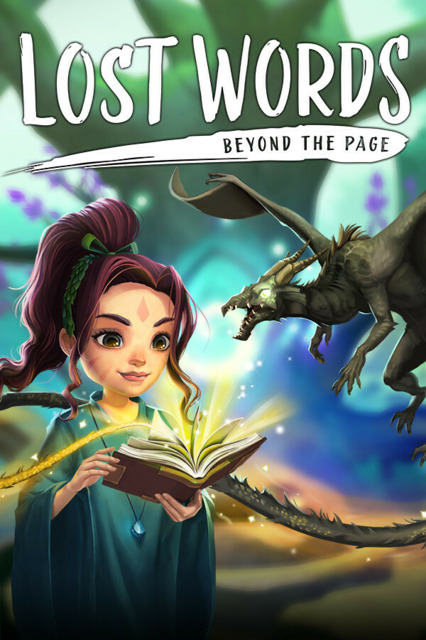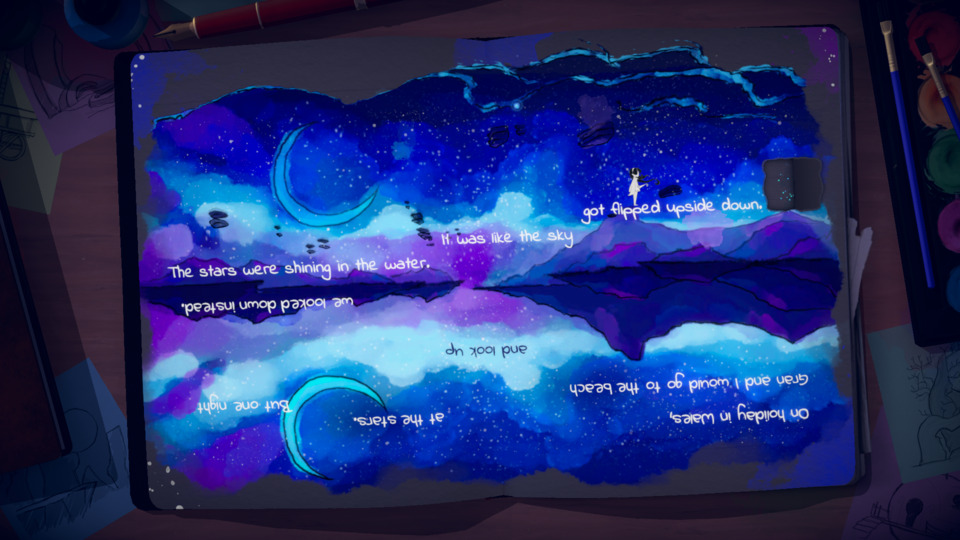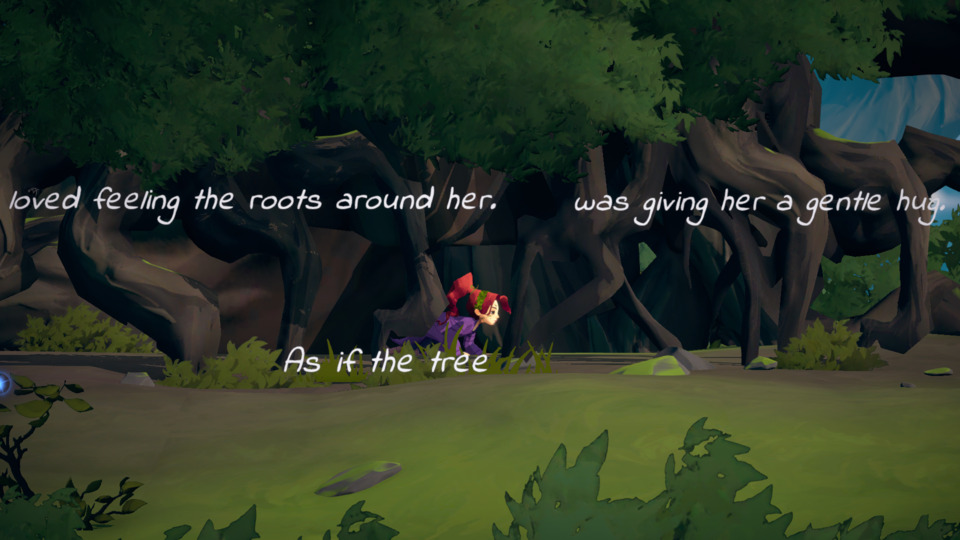
It's your weekly serving of Indie Games, and for this occasion we have yet another emotional puzzle-platformer. Whee. I only just covered Evergate a little while back but these particular types of games sprout like weeds. Well, perhaps that's too ungenerous an analogy; there's a reason I keep playing these things, after all, and the way they tend to weave storytelling with apposite game mechanics continues to be a rich vein for game designers and authors alike. Speaking of whom, Lost: Words: Beyond the Page has been graced with a script by Rhianna Pratchett, daughter of Terry and an established talent in the field of game authorship having written the story for the Tomb Raider reboots among others, and concerns a young girl named Isabelle "Izzy" Cooke who has aspirations to become a writer. She pursues this passion by starting a journal as well as her own fantasy novel, both of which she contributes to on a regular basis. However, when her beloved scholarly grandmother suffers a stroke and Izzy's world takes a turn for the bleak and uncertain, her feelings of self-doubt, sadness, and grief start filtering through the autobiographical chronicles of her life and the fantasy narrative she's in the process of spinning.
Naturally, most of the gameplay takes place in the world of the fantasy novel, where the player-named heroine is chosen as the new guardian of the protective fireflies that keep her treehouse village safe. A sudden attack by a dragon causes the fireflies to scatter and the village to be burned to the ground, and the vengeful guardian runs off in pursuit of the dragon and fireflies alike. As the guardian, the heroine is blessed with "word magic"—the ability to change reality by invoking a small number of words like "rise" or "break"—and much of the simple gameplay involves using the right words at the right spots while doing the usual running and jumping 2D platformer business. Izzy's interstitial diary entries operate on a similar basis: you jump between words written on the page, sometimes manipulating them with a cursor-like helper to create the new sentence-platforms necessary to reach the next entry.

The game is very clearly built with a younger audience in mind. Izzy's travails with her family problems, and how it's reflected in her novel, are written with an empathetic approach that would perhaps best benefit any younger players perhaps faced with a similar upheaval to their lives. Izzy talks like a typical pre-teen: precocious and mercurial, prone to speaking her mind about her family members and circumstances but generally a good-natured kid with an insatiable curiosity about the world. That this curiosity was largely fostered by her grandmother makes her condition all the harder for Izzy to bear, so don't expect this to be a game with a lot of cheerful moments. That said, the goal is about working through the grieving process and seeing a light at the end of the tunnel through both the eyes of Izzy and her heroine both, so it's ultimately pretty hopeful despite its darker moments.
The "young audience" conjecture is also corroborated by the gameplay's overall simplicity: there's no harsh challenges, deep ruminations, or tight timing required with any of its platforming or puzzles, and you only ever have access to a half-dozen commands at most which definitely keeps it erring towards the easy. It can sometimes be a little ambiguous about which skill to use—"rise," for instance, will raise platforms to lift you up while "repair" will fix things like bridges and lifts; even though in many cases either command would feasibly work if, say, there's a broken platform lying on the ground, there's usually only one that will—it's unlikely to stymie you for long. Finding all the collectibles, if that's your thing, is a little tougher but not if you're paying close enough attention. The game very rarely hides anything from you, after all. It's also extremely linear, but that's to be expected with a narrative-heavy game.

The game's central story is a bittersweet affair that adroitly weaves itself around its tale of Izzy and the tale-within-a-tale of a girl chasing an angry dragon to the ends of the Earth, making it evident how Izzy's real-world feelings of hopelessness and despair are seeping into her otherwise benign story about magical words and fireflies, and is definitely the game's highlight. The gameplay, meanwhile, just comes off as a little too basic, though the interactive diary entries do have some imaginative moments (it's kinda too bad I recently completed Psychonauts 2, which did something similar with the "walking inside a book" idea but with a higher budget). The presentation's also excellent, the game's use of bright colors and orchestral music elevating the fantasy story and is expertly subverted when all color seems to drain from Izzy's world due to her depression. There's also the fact that this game has a heart a mile wide, so it's hard to be too critical of its faults; it may sound like I'm making excuses, but sometimes a game just has to be good enough mechanically to prop up the story it's telling rather than the usual inverse with the AAA blockbusters of old. That's certainly been true with Indie games and its influx of storytellers wishing to engage with this relatively inchoate narrative medium and the unique, reader-immersive directions it can take those stories in. I can't help but think of this game as very cute, using a term I hope doesn't come off as condescending (maybe "wholesome" instead?), so even if the core was sort of paper-thin there's much to commend it—especially to any precocious or creatively-minded child relatives in your vicinity.
Rating: 4 out of 5.
| < Back to 338: Glass Masquerade 3: Honeylines | 001-100 | 101-200 | 201-300 | > Forward to 340: Flipping Death |
Log in to comment